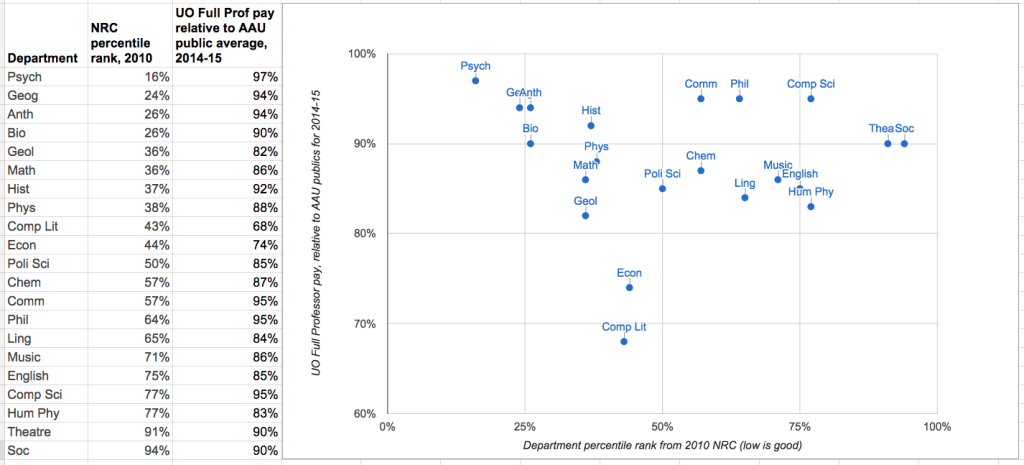The bottom line is that UO faculty are likely to slip back a little relative to peers. Nothing like the disaster had Coltrane and Moffitt implemented their 1/3% per year plan, but potentially an issue for hiring and retention.
InsideHigherEd has the summary on the CUPA salary survey, here. They break salaries out by faculty rank and some very odd disciplinary categories – but not by the schools Carnegie rank – just public private. They report an 2.2% median salary increase for TTF’s across public and privates. You have to pay to see more data. Presumably it will all show up on UO’s IR webpage here eventually. Many top privates aren’t in the CUPA data.
The AAUP salary survey will be out in a month or so, it will show salaries by rank and institution. The story quotes the AAUP as saying overall faculty salaries increased by 3.4%, same as last year, which is more than I expected. Keep in mind that does not count promotion raises – it’s the average increase in pay for faculty of a given rank, not the average rate of increase for a faculty member as they move up through the ranks.
Last July the faculty union’s late night bargaining got us this deal:
FY 2016: 2% ATB, $650 one-time goat money, pro-rated by FTE
FY 2017: 0.75% ATB, 2.25% merit pool
FY 2018: 0.75% ATB, 2.25% merit pool
4-8% promotion and 6 year review raises – call it another 1% a year.
So that means the average increases at UO, holding rank constant will be a little under 3% per year. Adjusting for the fact that HR insisted on delaying the raises for 6 months, means more like 2% for the past year, even with the goat.
As for equity, no progress that I’ve heard of. Here’s a recap, also from August:
The horizontal axis is the National Research Council’s 2010 ranking of UO PhD programs, see below for methodology. The vertical axis is average pay for UO full professors by department as a percentage of average pay at AAU publics for 2014-15. From UO IR,here.
I’m no econometrician, but the slope coefficient looks like zero to me. And lets not talk about the variance. There’s probably better data for department rankings but I doubt it changes the conclusion much: whatever system the UO administration is using to set faculty pay, it’s not about quality.

If a step increase isn’t a raise; if a cost of living adjustment isn’t a raise; if a change in pay for accepting a new position isn’t a raise, and if an increase because one is promoted isn’t a raise; can someone please explain to me what constitutes a “raise” so I will recognize one when I receive it? I would have thought any increase in one’s base pay was a raise but apparently others think otherwise. I’d love to see others’ ideas of what constitutes a raise since none of the above counts. I want to understand. Please help.
A step is certainly not an increase, it is a “are you living and breathing for another year?” change in salary. The money for said step comes from the etherous mass of money floating around every university campus and state building. It has nothing to do with actually doing anything, just being. To step or not to step, that is the question. Wether tis nobler in the mind to suffer the slings and arrows of actual production and work or to take up arms against a sea of step stoppers and by opposing get more steps.
I hope getting some permanent admins in with a plan will help.
That said, I’m making a good 30 something percent more than when I started here 5 years ago. Unfortunately my kiddos seem to have eaten nearly all of my raises and they are not even in high school yet….